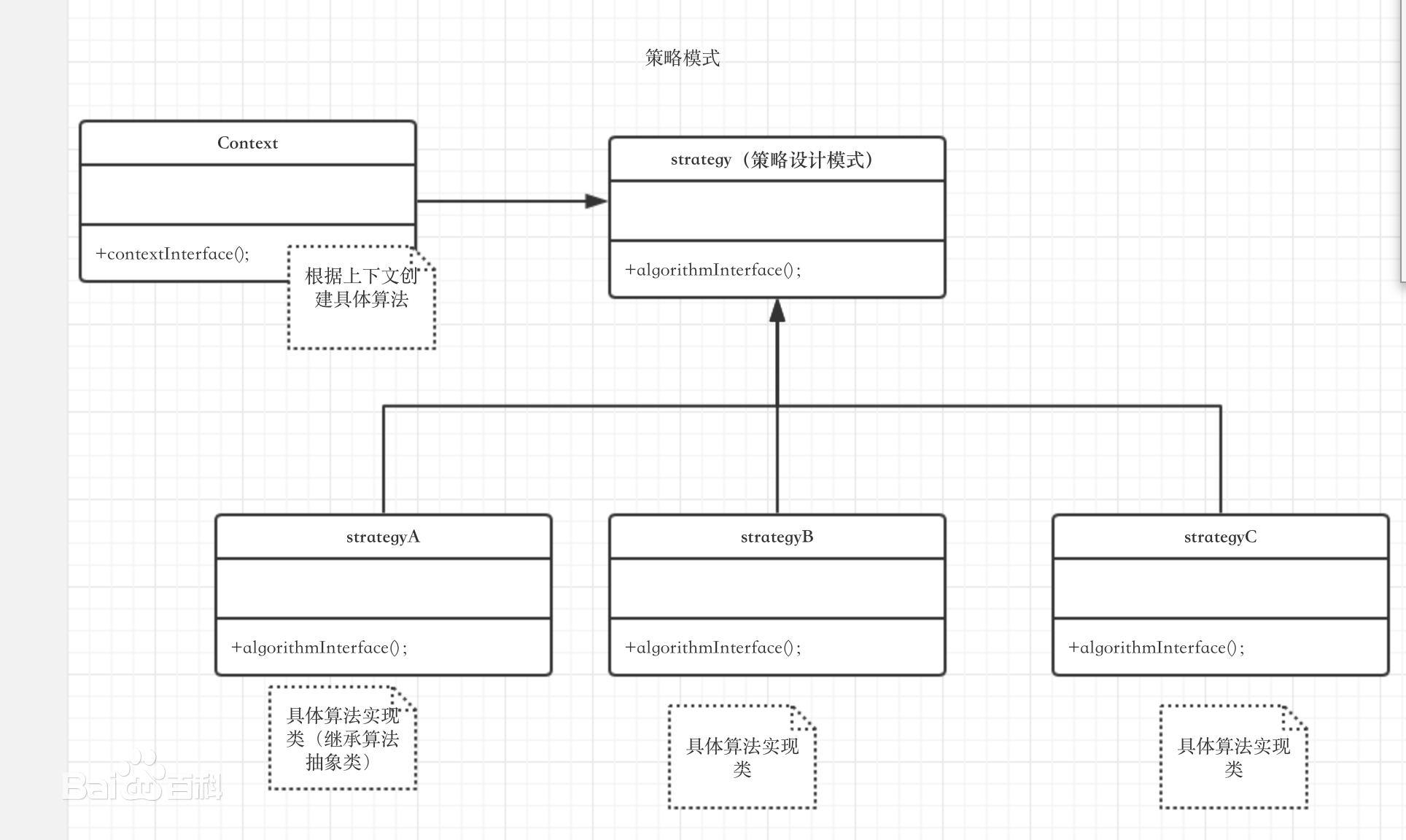介绍
策略模式(Strategy),就是⼀个问题有多种解决⽅案,选择其中的⼀种使⽤,这种情况下我们
使⽤策略模式来实现灵活地选择,也能够⽅便地增加新的解决⽅案。⽐如做数学题,⼀个问题的
解法可能有多种;再⽐如商场的打折促销活动,打折⽅案也有很多种,有些商品是不参与折扣活
动要按照原价销售,有些商品打8.5折,有些打6折,有些是返现5元等。
优缺点和场景
优点
- 完美符合开闭原则,可以再不修改原系统基础上选择算法行为,或者新增新的算法。
- 策略模式,将一类算法进行了抽象,可以将公共部分进行抽离。避免重复代码。
- 策略模式对算法的封装,将算法的责任和算法本身分割开,交给不同的对象管理。提供了可替换继承关系的办法,如果不用策略模式,那么环境类,可能自己就有多个子类了,算法和算法的使用还在一起,那就不符合开闭原则。
- 可以避免多重条件选择语句。
- 算法抽离后,更方便不同的环境类复用。
缺点
- 客户端必须知道所有的策略类,并且决定使用哪一个。
- 造成了很多具体的策略的类,细小的变化都需要增加新的具体策略类。
使用场景
- 系统需要动态的在某些算法里进行选择,那么使用策略模式,用户只要维持一个算法的抽象类对象即可。
- 一个对象有很多的行为,避免在一个类里,根据不同的条件进行多重条件判断时。(if(a) 行为a if(b)行为b 将a和b拆成两个具体类。) 可以使用策略模式,将不同的行为,抽象成具体的策略类。
- 需要将具体的算法实现,和使用者进行解耦,提高算法的保密性和安全性。
结构
略模式对算法的封装,将算法的责任和算法本身分割开,交给不同的对象管理。使用算法的上下文环境类中,针对抽象的策略类进行编程。符合依赖倒转原则,并且出现了新的算法时,只需要增加一个新的实现即可。
- **策略(Strategy) **定义所有⽀持算法的公共接⼝。 Context 使⽤这个接⼝来调⽤某 ConcreteStrategy 定义的算法。
- **策略实现(ConcreteStrategy) **实现了Strategy 接⼝的具体算法
- **上下⽂环境(Context) **维护⼀个 Strategy 对象的引⽤,⽤⼀个 ConcreteStrategy 对象来装配可定义⼀个接⼝⽅法让 Strategy 访问它的数据
UML类图

基础案例
针对不同商品的打折算法,在引入策略模式前,由一个算法类的方法维护,包含大量的条件转移,并且也不利于维护。
代码下载:strategy.zip
引入策略模式前
引入策略模式前,不同的打折算法的计算过程存在的问题。
- 有多重条件选择语句,代码混乱
- 不同的算法没有办法进行在别处复用
- 新增算法的话,需要修改原来的代码,不符合开闭原则。
package behavioralPattern.strategy;
import java.text.MessageFormat;
/**
* 引入策略模式前,不同的打折算法的计算过程
* 1.有多重条件选择语句,代码混乱
* 2.不同的算法没有办法进行在别处复用
* 3.新增算法的话,需要修改原来的代码,不符合开闭原则。
*
* @author liuyp
* @date 2022/09/25
*/
public class BuyGoods {
private String goods;
private double price;
private double finalPrice;
private String desc;
public BuyGoods(String goods, double price) {
this.goods = goods;
this.price = price;
}
public double calculate(String discountType) {
if ("discount85".equals(discountType)) {
finalPrice = price * 0.85;
desc = "该商品可享受8.5折优惠";
} else if ("discount6".equals(discountType)) {
finalPrice = price * 0.6;
desc = "该商品可享受6折优惠";
} else if ("return5".equals(discountType)) {
finalPrice = price >= 5 ? price - 5 : 0;
desc = "该商品可返现5元";
} else {
finalPrice = price;
desc = "对不起,该商品不参与优惠活动";
}
System.out.println(MessageFormat.format("您购买的商品为:{0},原价为: {1},{2},最终售卖价格为:{3}", goods, price, desc, finalPrice));
return finalPrice;
}
}
引入策略模式
修改步骤
- 策略: 引入抽象类,所有的价格计算算法实现该抽象类。
- 策略实现:针对原有的if else中的价格计算算法,分别在一个个具体的策略实现类中进行实现。
- 环境类:购买商品的类中,只需要维护一个策略抽象类的引用即可,传入不通风策略实现,即可实现不同的打折策略。
抽象打折策略
/**
* 策略模式中,对策略的抽象层。
* 抽象出了公共的描述、价格属性。
* 定义了需要子类实现的,具体的打折策略方法。
*
* @author StoneYu
* @date 2022/09/25
*/
public abstract class AbstractDiscount {
protected double finalPrice;
protected String desc;
public AbstractDiscount(String desc) {
this.desc = desc;
}
public double getFinalPrice() {
return finalPrice;
}
public void setFinalPrice(double finalPrice) {
this.finalPrice = finalPrice;
}
public String getDesc() {
return desc;
}
public void setDesc(String desc) {
this.desc = desc;
}
public abstract double discount(double price);
}
拆分各个打折策略的实现
public class Discount6 extends AbstractDiscount {
public Discount6() {
super("该商品可享受6折优惠");
}
@Override
public double discount(double price) {
finalPrice = price * 0.6;
return finalPrice;
}
}
public class Discount85 extends AbstractDiscount {
public Discount85() {
super("该商品可享受8.5折优惠");
}
@Override
public double discount(double price) {
finalPrice = price * 0.85;
return finalPrice;
}
}
public class NoDiscount extends AbstractDiscount {
public NoDiscount() {
super("对不起,该商品不参与优惠活动");
}
@Override
public double discount(double price) {
finalPrice = price;
return finalPrice;
}
}
public class Return5 extends AbstractDiscount {
public Return5() {
super("该商品可返现5元");
}
@Override
public double discount(double price) {
this.finalPrice = price >= 5 ? price - 5 : 0;
return finalPrice;
}
}
修改环境类,只需要维护策略的引用
/**
* 策略模式-环境类
* 使用策略模式优化后的购买商品的方法
* 1.没有了各种if-else
* 2.不需要关注算法的具体实现,只需要维护一个策略的抽象类引用。符合依赖倒转原则
*
* @author StoneYu
* @date 2022/09/25
*/
public class BuyGoods {
private String goods;
private double price;
private AbstractDiscount abstractDiscount;
public BuyGoods(String goods, double price, AbstractDiscount
abstractDiscount) {
this.goods = goods;
this.price = price;
this.abstractDiscount = abstractDiscount;
}
public double calculate() {
double finalPrice = abstractDiscount.discount(this.price);
String desc = abstractDiscount.getDesc();
System.out.println(MessageFormat.format("商品:{0},原价:{1},{2},最 终价格为:{3}", goods, price, desc, finalPrice));
return finalPrice;
}
}
Spring中实践
新建策略接口
public interface DiscountStratege {
/**
* 折扣方法
*/
void discount();
}
具体的策略 1
/**
* 具体策略实现1
*
* @author LiuYuping
* @date 2024/03/14 15:14
*/
@Component
public class FullReductionDiscountStratege implements DiscountStratege{
@Override
public void discount() {
System.out.println("满减策略,满一百减100");
}
}
具体策略 2
/**
* 具体策略实现2
*
* @author LiuYuping
* @date 2024/03/14 15:15
*/
@Component
public class WeekDayDiscountStratege implements DiscountStratege{
@Override
public void discount() {
System.out.println("这里是周末满减策略");
}
}
策略枚举,保存所有策略名称
public enum DiscountStrategeEnum {
WEEK_DAY_STRATEGE("fullReductionDiscountStratege","满一百减一百"),
FULL_REDUCTION("weekDayDiscountStratege","周末满减策略");
String concernedStrategeBeanId;
String strategeName;
DiscountStrategeEnum(String concernedStrategeBeanId, String strategeName) {
this.concernedStrategeBeanId = concernedStrategeBeanId;
this.strategeName = strategeName;
}
public String getConcernedStrategeBeanId() {
return concernedStrategeBeanId;
}
public String getStrategeName() {
return strategeName;
}
}
策略 Context 保存所有策略 Bean 示例
@Service
public class DiscountStrategeContext {
@Autowired
private Map<String,DiscountStratege> allDiscountStrategeMap;
/**
* 获取指定的策略
*
* @param discountStrategeEnum 折扣策略枚举
* @return {@link DiscountStratege}
*/
public DiscountStratege getStratege(DiscountStrategeEnum discountStrategeEnum){
return allDiscountStrategeMap.get(discountStrategeEnum.getConcernedStrategeBeanId());
}
}
用例
在需要使用策略的地方,按需注入指定类型的策略对象,新增策略时不需要修改原有代码
@SpringBootTest
class DemoApplicationTests {
@Autowired
DiscountStrategeContext discountStrategeContext;
@Test
void testDiscountStratege() {
DiscountStratege stratege = discountStrategeContext.getStratege(DiscountStrategeEnum.WEEK_DAY_STRATEGE);
stratege.discount();
}
}






















 1554
1554











 被折叠的 条评论
为什么被折叠?
被折叠的 条评论
为什么被折叠?








